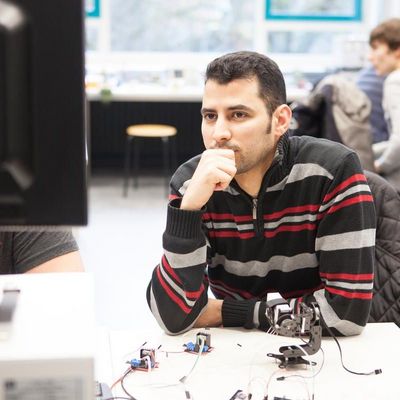![[Translate to English:] [Translate to English:]](/assets/hsb/de/_processed_/8/3/csm_RS1149__MG_8641-1600px_5b11317507.jpg)
School of Electrical Engineering and Computer Science
Your global career in intelligent electronics starts here.
Gain advanced skills in electronics, microsystems and smart systems – fully taught in English, practice-oriented and PhD-ready.
| Degree | Master of Science |
|---|---|
| Start of study | Winter semester (90 credits), Summer semester (90 credits), Summer semester (120 credits) |
| Application period Winter semester | 01 June until 15 July |
| Application period Summer semester | 15 December until 15 January |
| Application period Summer semester | 01 June until 15 October |
| Standard period of study | 3 semesters/4 semesters |
| Accredited | |
| Admission restricted | Yes |
| Admission requirements | |
| Language of instruction | English |
| Faculty/institution | School of Electrical Engineering and Computer Science |
| Stay abroad | No |
| Study format | Dual study optional |
Find the study track that fits your background – start here to explore your options.
You have a degree in Electronics, Electrical Engineering or a related field – and want to specialize in intelligent systems?
Our English-taught master’s programme Electronics Engineering (M.Sc.) provides advanced knowledge in System-on-Chip design, embedded systems, microsystems technology, sensors, signal processing and artificial intelligence. It prepares you for high-level roles in industry, research and development – or a doctoral degree.
© Dennis Welge
This master’s programme is aimed at graduates who:
If you are ready to take your skills to the next level – this programme is made for you!
With a master’s degree in Electronics Engineering, you will be well equipped to shape the technologies of the future!
Our graduates take on exciting roles in:
embedded systems and smart electronics
automation, robotics and industrial AI
aerospace, automotive, optical metrology and telecommunications
They work in a wide range of high-tech industries – in Bremen and throughout Germany. Others go on to undertake doctoral studies at renowned universities and research institutes.
Whether your goal is to become a technical specialist, lead projects or pursue an academic career – this programme opens doors.
Most research projects are conducted in close cooperation with regional industry or research institutions. Research related to topics covered by our master´s programme Electronics Engineering is primarily associated with activities of three institutes at Hochschule Bremen.
„The programme gave me the confidence and skills to work on real engineering challenges – in a German company, in an international team.“
Student perspective
Depending on your previous degree, you can study the master´s programme in Electronics Engineering in two different formats – each available as either a standard or dual study option.
3-semester option (90 ECTS): for applicants holding at least 210 ECTS from a prior degree
4-semester option (120 ECTS): for applicants with 180 ECTS, e.g. most international Bachelor's degrees
Choose your version to see programme details and how to apply.

